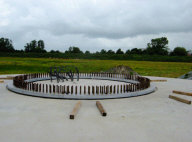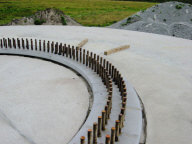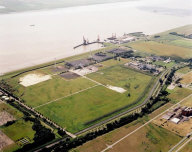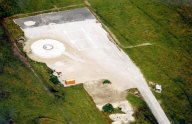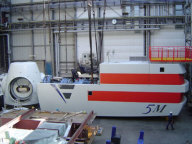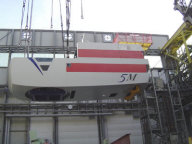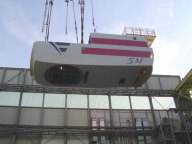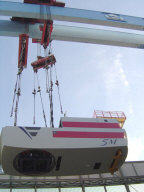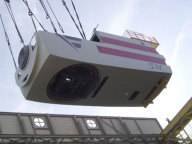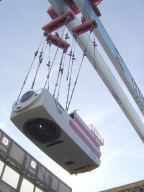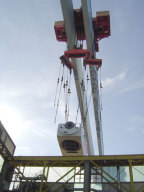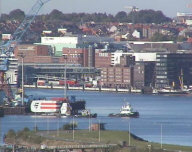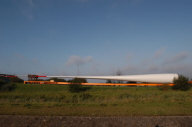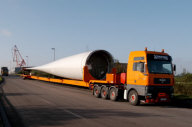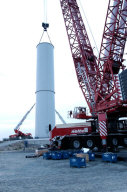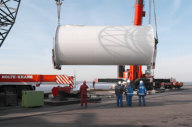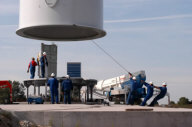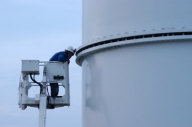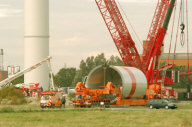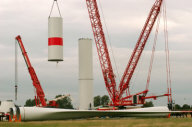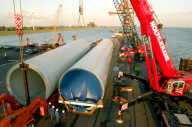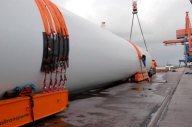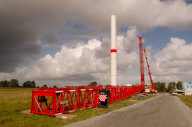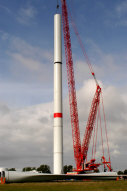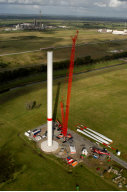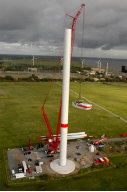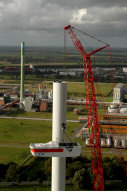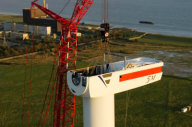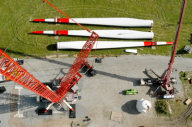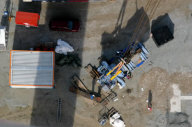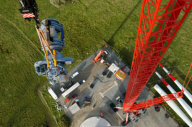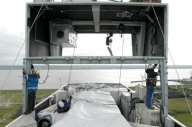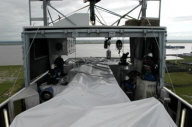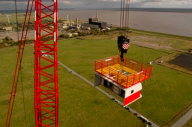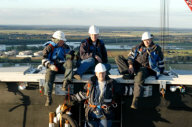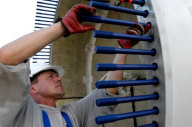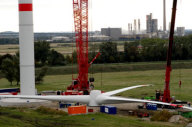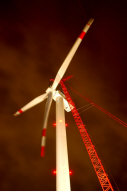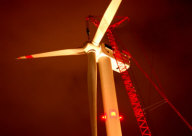The World's Largest Wind Turbine
Back to xpda.comThese pictures and comments were stolen from REpower's web site.
They deserve all credit, except for the mistakes, which I claim.
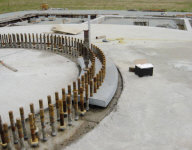
The work on the foundation for the prototype of
the REpower 5M turbine (5MW), in Brunsbüttel, Northern Germany has been completed. Due to its height of 183
metres and its weight of 1,100 tons (rotor and nacelle: approx: 380 tons) the wind turbine requires an
extremely large foundation.
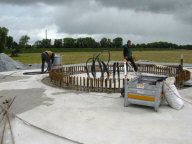
The foundation includes 40 concrete piles, each measuring 24
metres in length. 1,300 cubic metres of concrete and 180 tons of steel have been used. Only a circular base
plate with a diameter of around 23 metres will be visible.
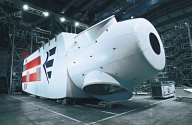
All the installation work on the nacelle and hub is completed.
The heart of the REpower 5M is now clad and is ready to be taken away. The components are shipped on a
pontoon along the Kiel Canal from Kiel to the Brunsbüttel Port on the River Elbe.
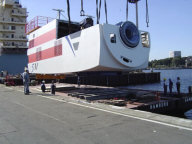
The turbine's central components - the hub and nacelle - were
loaded onto a pontoon at Howaldtswerke-Deutsche Werft AG (HDW) where the turbine was assembled. The voyage
via the North & Baltic Sea Canal will last approximately nine hours.
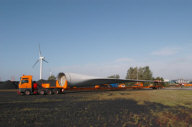
The three longest rotor blades ever produced, each having a blade
length of 61.5 m, will be transported overland in a wide load convoy to Brunsbüttel from the Danish rotor
blade manufacturer LM Glasfiber A/S.
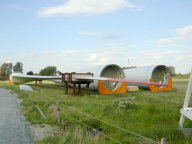
Delivery was taken of the third rotor blade. The turbine should
be completed in around ten days, depending on the weather.
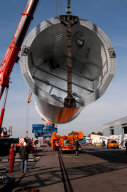
September 17, 2004. By erecting the tower the go-ahead for
constructing the world's largest wind energy turbine REpower 5M was given in Brunsbüttel, Schleswig-Holstein
today. The tubular steel tower consists of five individual segments which are screwed on top of each other.
Today segments 1 and 2 with a height of 13.5 and 16.5 metres were completed. The height of segments 3 and 4
is 16.5 and 27.5 metres. The longest tower segment with a length of 40 metres is the last section to be
installed. Together with the height of the foundation of 3 metres and 3 further metres in the nacelle section
a total hub height of 120 metres is reached.
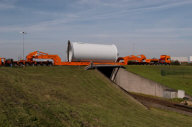
The tower tapers from 6 metres diameter at the height of the
foundation to 5.5 m at the top. It weighs a total of 750 tons and consists of 1,100 screwed connecting
elements. The construction is based on a ferro-concrete foundation which is borne by 40 concrete pillars
extending into the ground to a depth of 24 metres. Of the approx. 1,300 square metres of concrete and approx.
180 tons of steel which were used in the installation, only a circular plate with a diameter of 23 metres is
visible.
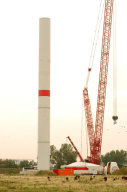
The fourth section of the tower was placed in position and
bolted. Thus the steel construction currently reaches a height of 73.5 metres. To continue the assembly work,
the crane will be lengthened today from a hook height of 105 metres to 135 metres. This will enable it to
lift the fifth and final tower section, with a length of 40 metres, and the nacelle components and the rotor
to a hub height of 120 metres.
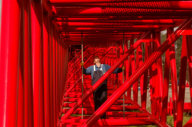
The 136-metre-high crane (135-metre hook height) was extended so
that work can begin on assembling the fifth and last part of the tower with a length of 40 metres. When this
is completed, the nacelle will be installed in several stages.
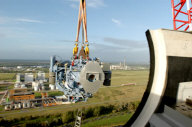
September 27, 2004. With the installation of the fifth and final
tower section having been completed, the assembly team has now begun installing the 18-meter-long,
six-meter-wide and six-meter-high nacelle on the tower. The nacelle is being assembled in several sections.
First of all the lower part of the nacelle was installed on the tower yesterday with the motor support, part
of the cladding and a large part of the cabling.
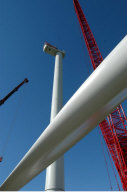
The third and final phase of construction work to build the
world's largest wind turbine, the REpower 5M, begins today with the fitting of the rotor. The rotor has a
diameter of 126 meters and, when rotating, sweeps across an area of 12,469 square meters. This is roughly the
size of two football pitches. Under normal operating conditions, the rotor will turn in relation to the wind
speed at between 7 and 12 revolutions per minute.
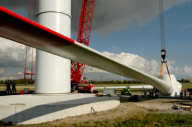
First of all, the three rotor blades, 61.5 meters in length and
weighing 18 tons each, will be fitted to the hub on the ground. In the next stage, the main crane will lift
the rotor, with a total weight of around 120 tons. While it is being lifted, a secondary crane will guide the
rotor from its horizontal starting position into a vertical position. At a height of 120 meters, the rotor
will be fitted to the turbine. Here the hub will be fitted to the rotor flange of the power train.
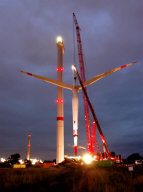
Following installation of the three 61.5-meter-long rotor blades
at ground level, the crane then had to perform its most difficult hoist of the erection work. The rotor, with
its diameter of 126 metres and total weight of 120 tonnes was lifted into a horizontal position and then
brought into a vertical position by a follow-up crane. At a height of 120 metres, the hub was connected to
the drive mechanism flange. With that, all the essential work on the prototype of the 5-megawatt turbine, the
REpower 5M, was concluded after just nine days' net working hours.
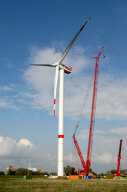
4 October 2004. With the installation of the rotor on Friday
evening, all the essential assembly work on the REpower 5M had been successfully completed.
By the end of the year, the largest wind turbine in the world with a rated output of 5 megawatts and a rotor diameter of 126 metres, will be supplying the grid with enough power for around 4,500 average households.
By the end of the year, the largest wind turbine in the world with a rated output of 5 megawatts and a rotor diameter of 126 metres, will be supplying the grid with enough power for around 4,500 average households.
